Pre-Olympic Disasters in Rio
Nathan Johnson
Published
07/27/2016
in
wow
is Brazil really ready to host the Olympic games?
- List View
- Player View
- Grid View
Advertisement
-
1.
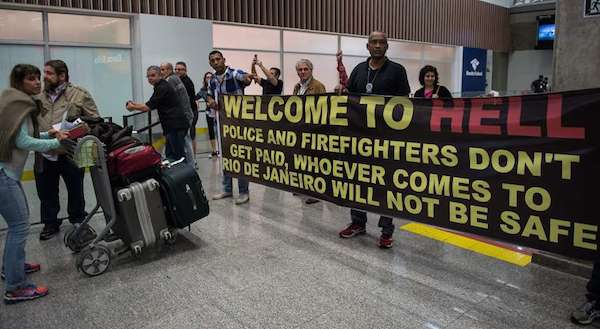 Violence is on the rise in Rio, and police officers are at an impasse with the state government after claiming they've not been paid for months. The message from police to tourists is evident: We won't be able to protect you. The state's officers vented with a sign saying, "Welcome to Hell," outside Rio's main airport in June 2016. "Police and firefighters don't get paid, whoever comes to Rio de Janeiro will not be safe," the sign said. Brazilian officials put on a united front to assure the world that the city was indeed up to the task of hosting sport's greatest showpiece. However, Mayor Eduardo Paes reiterated that the state was doing a "terrible" job regarding security in the lead-up to the games.
Violence is on the rise in Rio, and police officers are at an impasse with the state government after claiming they've not been paid for months. The message from police to tourists is evident: We won't be able to protect you. The state's officers vented with a sign saying, "Welcome to Hell," outside Rio's main airport in June 2016. "Police and firefighters don't get paid, whoever comes to Rio de Janeiro will not be safe," the sign said. Brazilian officials put on a united front to assure the world that the city was indeed up to the task of hosting sport's greatest showpiece. However, Mayor Eduardo Paes reiterated that the state was doing a "terrible" job regarding security in the lead-up to the games. -
2.
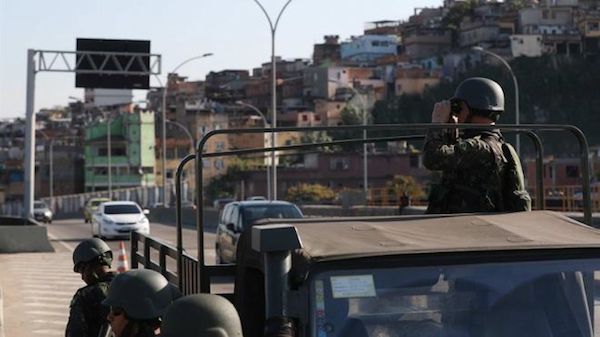 Despite arresting a dozen ISIS sympathizers suspected of plotting to carry out an attack during next month's 2016 Games, Brazilian police have confirmed they are investigating another group of possible would-be terrorists. A journalist from Globo television infiltrated the group online. He heard suspects refer to the Olympics, which begin August 5, 2016, as an opportunity to "strike at our enemies." Members of the group also discussed purchasing weapons and swore allegiance to ISIS, despite there being no evidence of actual contact. Brazil's anti-terrorism law provides for sentences of up to eight years in prison for glorifying terrorist activity. Preparing to stage an attack carries a maximum of 15 years behind bars.
Despite arresting a dozen ISIS sympathizers suspected of plotting to carry out an attack during next month's 2016 Games, Brazilian police have confirmed they are investigating another group of possible would-be terrorists. A journalist from Globo television infiltrated the group online. He heard suspects refer to the Olympics, which begin August 5, 2016, as an opportunity to "strike at our enemies." Members of the group also discussed purchasing weapons and swore allegiance to ISIS, despite there being no evidence of actual contact. Brazil's anti-terrorism law provides for sentences of up to eight years in prison for glorifying terrorist activity. Preparing to stage an attack carries a maximum of 15 years behind bars. -
3.
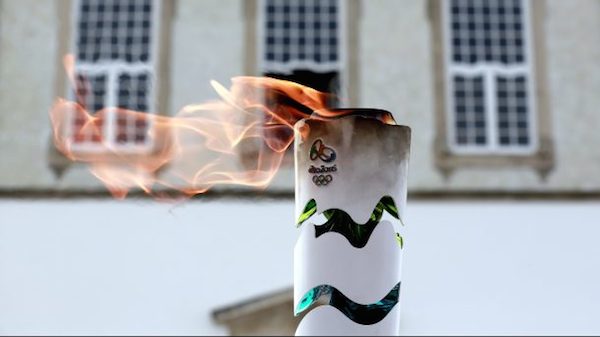 The torch relay in Rio has been fraught with problems from the get-go. A Jaguar, who was part of a torch ceremony in Manaus, escaped and was shot in June, a spectator tried to put the torch out with a fire extinguisher (he failed), and another sought to put it out with water (he too, failed). There have been two face plants, and most recently, a man was wrestled to the ground and arrested after he attempted to steal the torch. The torch will arrive in Rio de Janeiro on August 4, 2016, the day before the opening ceremony, after passing through more than 300 cities in Brazil on its journey from Greece. Let's hope it makes it in one piece!
The torch relay in Rio has been fraught with problems from the get-go. A Jaguar, who was part of a torch ceremony in Manaus, escaped and was shot in June, a spectator tried to put the torch out with a fire extinguisher (he failed), and another sought to put it out with water (he too, failed). There have been two face plants, and most recently, a man was wrestled to the ground and arrested after he attempted to steal the torch. The torch will arrive in Rio de Janeiro on August 4, 2016, the day before the opening ceremony, after passing through more than 300 cities in Brazil on its journey from Greece. Let's hope it makes it in one piece! -
4.
 Just before the Olympic games are set to begin, athletes and tourists alike may have one more thing to worry about in Rio—kidnapping. Just ask Kiwi jiu-jitsu champ Jason Lee, who was kidnapped and robbed by Rio police. Lee was pulled over by two motorcycle officers who told him he was in violation by driving without his passport, and would be forced to pay a fine of approximately $600. (He did not know it at the time, but there is no such law in place.) After Lee had told the officers he didn't have the money on him, he was then forced to drive the wrong way down a highway to a police bunker, where he was made to switch to an unmarked police car. From there, the three men hit several ATMs and withdrew the cash. Lee was then released, but warned by the officers not to report the incident. He defied that warning. As a result, Policia Militar, Brazil's military police, showed up at his residence two days later, and he refused to let them in. He now awaits instructions from the New Zealand ambassador.
Just before the Olympic games are set to begin, athletes and tourists alike may have one more thing to worry about in Rio—kidnapping. Just ask Kiwi jiu-jitsu champ Jason Lee, who was kidnapped and robbed by Rio police. Lee was pulled over by two motorcycle officers who told him he was in violation by driving without his passport, and would be forced to pay a fine of approximately $600. (He did not know it at the time, but there is no such law in place.) After Lee had told the officers he didn't have the money on him, he was then forced to drive the wrong way down a highway to a police bunker, where he was made to switch to an unmarked police car. From there, the three men hit several ATMs and withdrew the cash. Lee was then released, but warned by the officers not to report the incident. He defied that warning. As a result, Policia Militar, Brazil's military police, showed up at his residence two days later, and he refused to let them in. He now awaits instructions from the New Zealand ambassador. -
5.
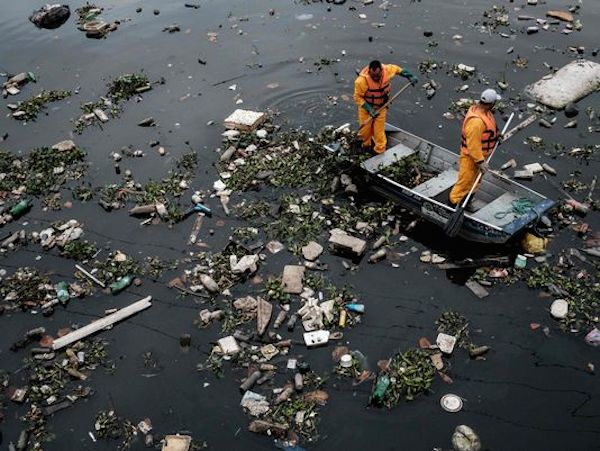 With the Olympics less than two weeks away, athletes and fans alike are discovering that Rio's Guanabara Bay is filthy. Tons of raw sewage are pumped into the bay each day, and practicing sailors have also complained about an oil slick that turned white boats brown. “We've never seen anything like this. It was all over the place,” said Finnish sailor Camilla Cedercreutz. “There was no way you could avoid it.” Guanabara Bay is severely polluted, and filled with bacteria and viruses. Organizing committee officials say the water is safe, although independent studies show a high level of pathogens in waters that Rio is using for sailing, rowing, canoeing and open-water swimming.
With the Olympics less than two weeks away, athletes and fans alike are discovering that Rio's Guanabara Bay is filthy. Tons of raw sewage are pumped into the bay each day, and practicing sailors have also complained about an oil slick that turned white boats brown. “We've never seen anything like this. It was all over the place,” said Finnish sailor Camilla Cedercreutz. “There was no way you could avoid it.” Guanabara Bay is severely polluted, and filled with bacteria and viruses. Organizing committee officials say the water is safe, although independent studies show a high level of pathogens in waters that Rio is using for sailing, rowing, canoeing and open-water swimming. -
6.
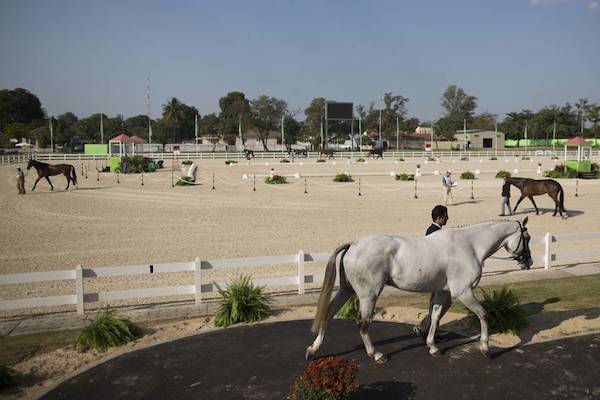 No, it isn't Zika. According to the powers that be, that won't be an issue, but there is a disease that poses a serious risk to the health of competitors ahead of this year's Olympics. The equestrian world is buzzing about an outbreak of Glanders disease, a deadly equine respiratory condition, as the sport's top riders and their mounts prepare to compete. Glanders is highly contagious and incurable. Brazilian agricultural officials have, thus far, destroyed hundreds of horses across the country over the past couple of years in an effort to stop the epidemic. Among those euthanized were two horses that had been housed at Rio's Deodoro Military Complex, where the Olympic equestrian events will be held. Olympic organizers say the facilities are safe, and they have followed strict international protocols to create a disease-free zone. Equine competitors arriving at Rio's airport will be screened in a protective biosphere, then whisked to the Olympic venue upon arrival and quarantined there for the duration.
No, it isn't Zika. According to the powers that be, that won't be an issue, but there is a disease that poses a serious risk to the health of competitors ahead of this year's Olympics. The equestrian world is buzzing about an outbreak of Glanders disease, a deadly equine respiratory condition, as the sport's top riders and their mounts prepare to compete. Glanders is highly contagious and incurable. Brazilian agricultural officials have, thus far, destroyed hundreds of horses across the country over the past couple of years in an effort to stop the epidemic. Among those euthanized were two horses that had been housed at Rio's Deodoro Military Complex, where the Olympic equestrian events will be held. Olympic organizers say the facilities are safe, and they have followed strict international protocols to create a disease-free zone. Equine competitors arriving at Rio's airport will be screened in a protective biosphere, then whisked to the Olympic venue upon arrival and quarantined there for the duration. -
7.
 The Australian delegation refused to enter the facilities at Olympic Village due to serious issues with plumbing and fire safety. When the athletes arrived and intended to check into their rooms, they found water flowing down the walls after flushing the toilets, a strong smell of gas, and exposed wiring. The team is currently staying in hotels while awaiting their accommodations for the games.
The Australian delegation refused to enter the facilities at Olympic Village due to serious issues with plumbing and fire safety. When the athletes arrived and intended to check into their rooms, they found water flowing down the walls after flushing the toilets, a strong smell of gas, and exposed wiring. The team is currently staying in hotels while awaiting their accommodations for the games. -
8.
 Nine laptops were stolen from the Olympic Center where the shooting events at the Olympics will be held. Police later found all the equipment and arrested the criminals, some of which were on-site security! Just a day earlier, transmission equipment from a German TV station was stolen from the Avenida Brazil. It too was found—in the Baixada Fluminense region.
Nine laptops were stolen from the Olympic Center where the shooting events at the Olympics will be held. Police later found all the equipment and arrested the criminals, some of which were on-site security! Just a day earlier, transmission equipment from a German TV station was stolen from the Avenida Brazil. It too was found—in the Baixada Fluminense region.
Violence is on the rise in Rio, and police officers are at an impasse with the state government after claiming they've not been paid for months. The message from police to tourists is evident: We won't be able to protect you. The state's officers vented with a sign saying, "Welcome to Hell," outside Rio's main airport in June 2016. "Police and firefighters don't get paid, whoever comes to Rio de Janeiro will not be safe," the sign said. Brazilian officials put on a united front to assure the world that the city was indeed up to the task of hosting sport's greatest showpiece. However, Mayor Eduardo Paes reiterated that the state was doing a "terrible" job regarding security in the lead-up to the games.
8/8
1/8
Categories:
Wow


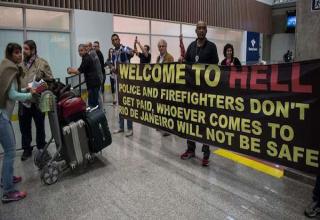





0 Comments